ABOUT THE PROJECT
Project Duration: January 2023 – January 2024
The importance and relevance of STEAM subjects have shown that it is necessary for children to get familiar with this area as soon as possible, and STEAM postulates are increasingly being used in the education of the youngest. Research has shown that early acquaintance (from primary school or even earlier) with STEAM has a positive effect on educational outcomes.

However, we constate thanks to surveys and studies (such as OECD’s PISA) that performance in the areas of mathematics and sciences does not reach acceptable levels in most of the participant counties. These alarming statistics signal that the teaching methods and approaches being applied are not working as efficiently as they should – from a very early age, mathematics seems to be a challenging topic even for early levels of primary school, which demotivates learners and causes further difficulties in education.
Furthermore, Math related disorders can start to be noticeable from preschool age according to the article “Specific learning disability in mathematics: a comprehensive review” (retrieved from Transl Pediatr. 2018 Jan; 7, on the 29th of March 2021). For this reason, it is important to engage and motivate students to learn mathematics in a less anxiolytic matter, meaning trying to avoid the drill-in method because students with SLD often have difficulties with memorizing numbers by hearing them, learning to count, sorting, corresponding numbers to objects and so on.
By employing methodologies, such as “game-based pedagogies” and “experiential learning”, as well as by assimilating the concept of “manipulation through history”, the project Steam builders in times aspires to bring a hands-on math approach in primary education classrooms. Such a conclusion has been based on the rationale (and the broad agreement) that math manipulation activities can change the perception of mathematics, especially by developing and strengthening its language, different from the school language and scientific popularization. In this sense, math manipulations through history must propose materials, spaces and actions that are not easily repeatable in other situations.

Moreover, in the case of the children’s audience, it is necessary that this approach can be used for consolidating specific contents, avoiding the natural loss of attention by utilizing materials that are easy to handle and highly communicative. Therefore, finding the best way to maintain the proximity bond and reinforce the collaborative frameworks and two-way communication and interaction between teachers/pupils of primary education AND other non-formal STEAM education providers is essential. This project will provide a series of tools for teachers to offer a cross-curricular experience to students that will help understand the evolution of mathematics and its importance, but also to get acquainted with mathematical concepts.
The results created in the project will be tested in all partner countries by teachers who will have been reached through partners’ networks and promotion activities. Sessions with learners will be organized to test the produced content. After these tests, partners will make the necessary modifications according to the feedback received.

The STEAM in Times project is co-financed by the ERASMUS+ program of the European Union, and will be implemented from January 2023 to December 2023. This website and the project content reflects the views of the authors, and the European Commission cannot be held responsible for any use which may be made of the information contained therein.
(Project code: 2022-2-BG01-KA210-SCH-000097380)